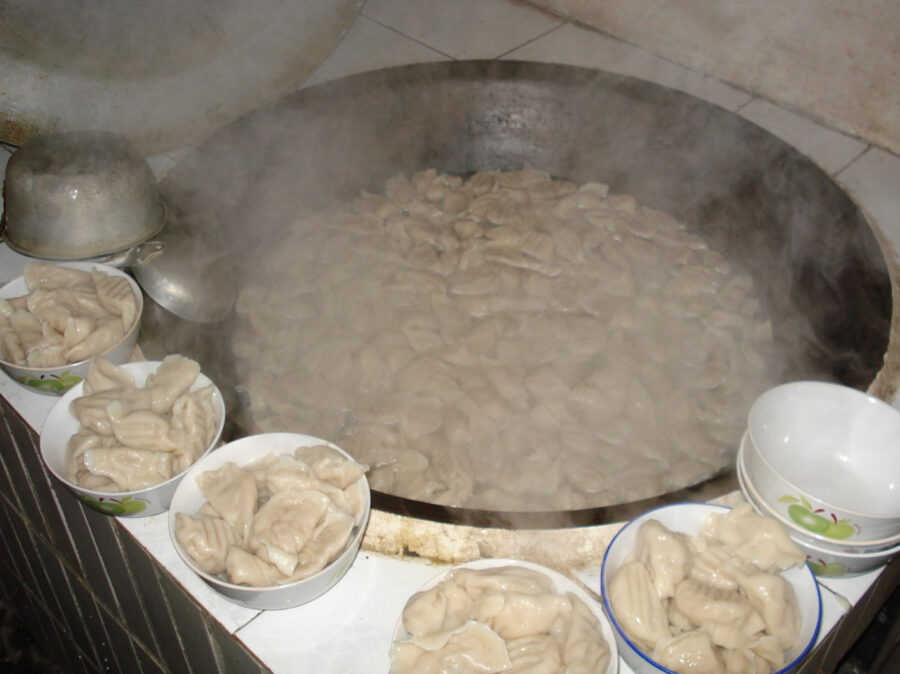How to Make Your Laolao’s Dumplings
Add water from the tap — one cup —
Who knows what recipes
You’ve found,
Chilling the water or heating it up.
Wen shui is fine, just right.
Add it to the flour, stir to make dough.
You’ll need more strength than that
to knead a dumpling pi that holds up
to steam and soup and your greedy bite,
that doesn’t break when boiled.
What do you know about this —
the heft you need in
the heel of your hand But all my aunts have worked the fields
to build something like resistance — Tilling, planting, spraying the pesticide
Look! How soft! — Before they rinsed away a sheen of
Not one callus, chemicals and dug their fingers into the
Not a single day of hard labor. sticky ooze of wetted flour.
Like my mother, they do this from scratch,
and must tend the meat, too.
Blade scraping bone, blade
knocking against wood,
Steady measures of staccato
Why don’t you like the smell of chives? To turn flesh into pulp.
Jiu cai is the most fragrant filling,
fills the whole room.
Cabbage has too much water,
all the flavor washed out.
If you insist, we’ll add
xiang gu for depth,
more ginger,
more scallion.
Shrimp will help, too,
but that is my secret.
Your laolao never used shrimp,
but you must never forget it.
The shrimp elevates.
Don’t oversalt, like your laolao,
who has been complaining
that statins make her dizzy.
Just a splash of soy sauce will do.
Add sesame oil last.
Only after the filling is mixed
and the dough has risen
and the aunts have done their duties
do the rest of us gather,
nose of sesame in the air.
— No, not all of us. —
Uncles gather elsewhere,
Emptying filmy bags of
Pickled things — wood ear, pig’s ear,
Cratered moons of lotus root —
Cracking open the first bottle of bai jiu,
Don’t put too much filling in. Cheering with their paper thimbles
You are greedy, While we stretch the dough, cut
I know this about you. Each wedge into a round, cup
When there is too much, Each round in the palm of our hands,
the dumpling will not seal shut. Talking that whole time,
Look at this. Wasted filling. Dropping the filling into the rounds,
All the juices will escape. Sealing the dough between thumb and
Don’t you know index, again, again,
What you stand to lose, That’s not the way I do it —
Wanting so much. Yours look like ingots —
I tried to show you how. Mine is like a pouch —
Maybe best you roll the dough. Not as delicate, but fast,
You are good at gan pi. The fastest — and yours! —
Just keep the edges thin. They are definitely the ugliest.
Why do you complain Didn’t your mother teach you
this is so much work? How to pinch a dumpling?
Don’t you like eating dumplings?
Who doesn’t like dumplings?
It is the best food.
There is nothing else like it.
What is empanada?
Like a samosa?
Pierogi, I know.
Cheese and potato.
How can that be good?
Where is the flavor?
Why do you always insist
on arguing with me?
Turn on the TV then.
I made too much dough again.
We always drank the soup.
It’s like water, but enriched
with starch. Don’t waste jiao zi tang.
For years, we ate only millet A meal is not a meal.
or cornmeal soups. A meal is an afternoon,
If we had noodles, Followed by a nap,
Your second uncle — he’s greedy, too — Followed by a hangover,
Ate his first bowl so fast Followed by another bite of that meal.
He’d choke, but run to get seconds
When some of us barely had a bite.
Nobody likes your second uncle. A meal is not a hangover,
Now there is some money, but no time. But a few hundred dumplings,
Your aunt over in Longhua Folded by hand,
— her husband heads south for work. Swimming together, bloating together,
Some kind of factory. Bobbing in a vat heated by charcoal
More money there, they say. And singed cornhusks.
Everyone has their lives to live.
No one has time for your laolao.
Hard to see each other, A meal is not a nap, but a chore,
even at New Year’s. Beginning when the day begins,
So busy, busy working, Night unthawing like a side of pork.
and everyone is mad
at your cousin again.
Give your aunt a call. A meal is not a chore, but a family,
The one in Beijing who’s lonely, Faces growing older and faces
minding the new grand-baby. You are missing. You see them less
Her dumplings had the best shape. Clearly every year, so why not
She can teach you See instead the faces in your memory,
to make dumplings. When all your children
But you will never make Came home to eat.
Your laolao’s dumplings.
You don’t even care
to know how. A meal is not a family, but a memory,
Lightly dusted in flour,
Voices blurred like cataracts,
A laugh you recognize,
An argument you’ve grown weary of.
Mostly happy cacophony,
Dimmer now, but how it echoes.

Diana Xin holds an MFA from the University of Montana. Her work appears most recently in Diagram, Electric Literature, Missouri Review, Baltimore Review, and Third Coast Magazine. She is a recipient of fellowships from Hedgebrook, the M Literary Residency in Beijing, and the Sitka Center for Art and Ecology. She lives in Seattle and serves as a contributing editor to Moss, a journal of the Pacific Northwest.
